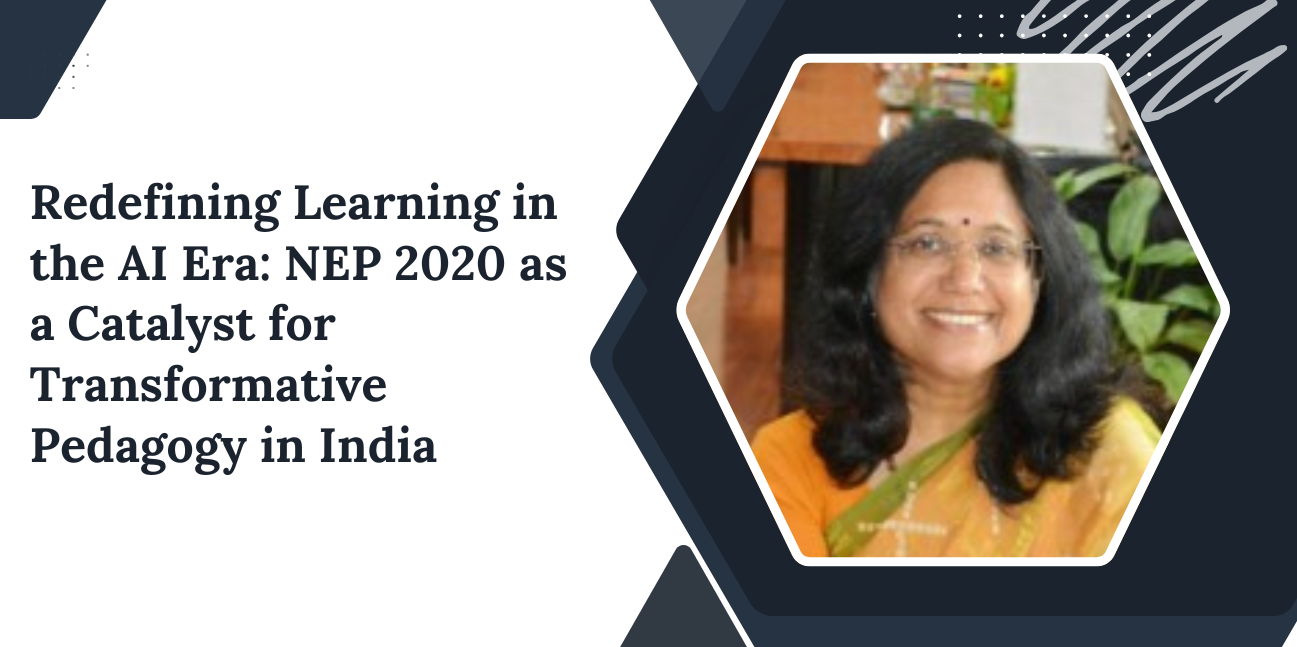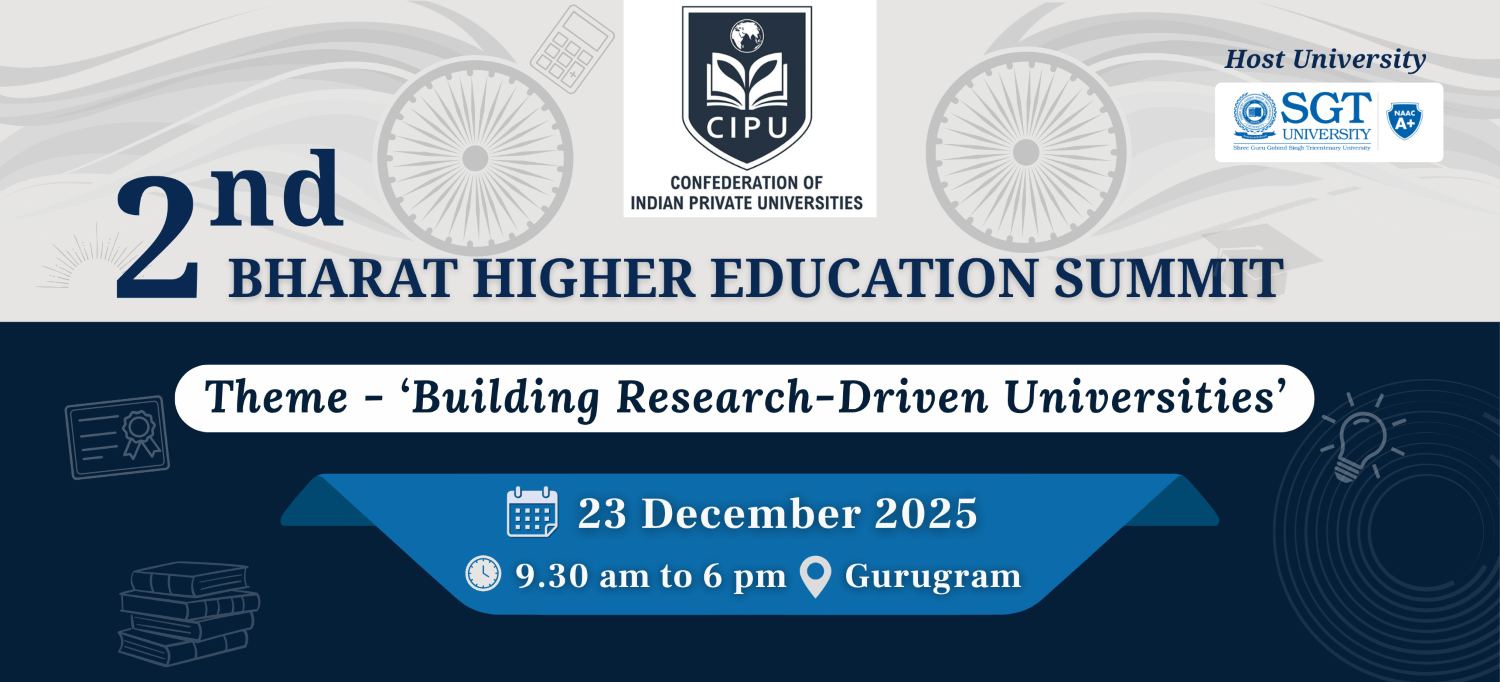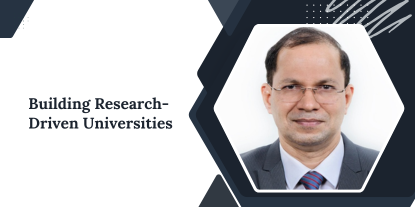
|
Prof. (Dr.) Sushma Yadav.
Chairperson, UGC Steering Committee, LOCF & Former Pro Vice Chancellor, Central University of Haryana, Mahendergarh |
At a time when artificial intelligence (AI) is transforming into the epistemic as well as infrastructural core of the Fourth Industrial Revolution, Indian higher education is at a point of inflexion. Embedding AI within curriculum and pedagogy offers more than a technological upgrade: it presents a civilizational opportunity to re-imagine education in interdisciplinary, inclusive, and future-ready ways. Through this transformational horizon, our country's National Education Policy (NEP) 2020 is a timely and visionary framework. It provides the structural and philosophical frame necessary to mainstream AI education while preserving India's diverse social, linguistic, and developmental contexts.
Pedagogical Innovation Aligned with NEP Principles
The NEP's emphasis on experiential learning, conceptual understanding, and flexibility aligns with what AI can enable in educational practice. AI-enabled feedback loops, AI-enabled tutoring systems, and AI-enabled Adaptive learning - all facilitate a level of personalization of education
Currently Member, KG Balakrishnan Commission & Chairperson, UGC Steering Committee, LOCF. Formerly served as Vice-Chancellor, Bhagat Phool Singh Mahila Vishwavidyalaya, Haryana; Pro Vice Chancellor, Central University of Haryana & IGNOU, & Member, University Grants Commission.
PhD Research Scholar, Institute of Development Studies Kolkata (IDSK) at a scale that aligns with the NEP's assertion to move away from rote memorization towards "learning how to learn." AI can detect gaps in real-time and provide targeted differentiated learning in response to this- thus bringing the NEP's learner-centred vision to fruition.
Nevertheless, Freirean pedagogy also reminds us that education needs to build critical consciousness. Indian institutions must go beyond content automation and use AI tools to cultivate reflective and ethical learners. Integrating AI into the curriculum should include not only neural networks, machine learning, but also conversations around algorithmic bias, surveillance, and data colonialism. Thereby, learners would become active co-creators rather than being mere passive consumers of AI content.
Multidisciplinary Curricula and Epistemic Integration
The NEP's vision of multidisciplinary education is strikingly instrumental in the context of growing dominance of artificial intelligence in our education system. Compared to former approaches that strongly contained disciplinary AI in engineering and sciences, NEP provided legitimacy and institutional space to promote learning across disciplines. AI cannot be treated as a domain-specific competence set; instead, AI is a structuring logic operating across disciplines, including medicine, law, governance, arts, and climate studies.
Thereby, Indian higher education institutions must design AI-based curricula focusing on technical literacy and ethical reasoning within their disciplines. An example of this can be a course titled 'AI and Society', wherein students of diverse fields, including computer science, political science, sociology, and law, can explore and analyze algorithms' implications for legal processes, public policy development, and democratic imagination.
Some elite institutions, such as the Indian Institute of Technology (IIT) Madras (BSc in Programming and Data Science) and Ashoka University (interdisciplinary Centre for AI and Society), are already placed along these lines. The question is how to meaningfully scale these institutional models into the broader higher education ecosystem.
Reimagining Employability through NEP's Skilling Framework
The NEP 2020 is anticipating a new understanding in India of employability - from the accumulation of degrees to skills acquisition, continuous learning, and flexible pathways toward employment. AI integration should be considered in that new understanding of employability. Technical capabilities required for AI (data science, natural language processing, computer vision, etc.) are necessary but not enough. In addition to the technical capabilities, the future workforce requires socio-emotional components of intelligence, systems thinking, and ethical reasoning.
AI can become a collaborator in skill building through simulation, gamification, and performance analytics. AI systems can augment vocational education, facilitate upskilling, and support just-in-time learning. Meanwhile, higher education institutions need to place AI's socio-economic context upfront. When low-skill jobs are threatened by automation, higher education in India must prepare its students for a post-industrial economic environment based on platform labor, gig economies, and global value chains.
Programs like SWAYAM, NASSCOM's Future Skills Prime and AICTE's AI skill hubs exemplify the NEP's aspiration for blended learning ecosystems that align digital facilities with institutional change. These assets can also be leveraged to level the playing field and provide access to AI training programs for marginalized learners.
Equity, Language, and Inclusion: Core NEP Commitments
A hallmark of NEP 2020 is its frank concern for inclusion, whether through mother-tongue education, gender parity, or regional equity. Inclusion in the era of AI must go beyond access to resources or infrastructure. It must address epistemic justice as the right to learn, produce, and critique knowledge in one's language, culture, and social context.
AI education in India must reflect this plurality. Higher educational institutions should offer AI-related courses in regional languages, concoct accessible content for differently abled learners, and develop tools for marginalized communities. NEP's focus on Open Educational Resources (OER), digital repositories, and teacher training can support such efforts. Further, public universities must be equipped with AI labs, multilingual platforms and cloud-based tools to bridge the digital divide.
Moreover, inclusivity in AI education must be intersectional. Caste, gender, and rural-urban divide interact complexly to structure educational outcomes. The NEP's call to track equity indicators and expand affirmative action must extend to AI skilling programs and digital learning platforms.
Ethical and Contextual Imperatives
NEP 2020 concocts higher education rooted in our cultural values and traditions while being globally relevant. This dual vision is especially salient in the domain of AI. Global models of artificial intelligence governance are largely shaped by techno-capitalist interests and often disregard the needs and aspirations of the Global South. Indian HEIs must develop an indigenous AI ethic deeply rooted in our nation’s constitutional values: dignity, plurality, and environmental sustainability.
Courses/ Programs in AI ethics should thus foreground issues such as data privacy, caste-based algorithmic bias, and the use of AI in predictive policing. These must be anchored in Gandhian, Ambedkarite, and Tagorean pedagogical traditions emphasizing dignity, community, and justice. By doing so, Indian universities can reclaim epistemic sovereignty in a global AI landscape dominated by Silicon Valley logic.
Conclusion
The AI era demands not only technological adaptation but also institutional imagination. NEP offers Indian higher educational institutions a broad blueprint to align innovation with inclusion and employability with ethicality. An AI-integrated curriculum and pedagogy could democratize knowledge, promote critical citizenship built around NEP principles, and equip India's youth to lead in an ever-changing world. The task ahead is to operationalize it urgently, creatively, and with an abiding commitment to social justice.






